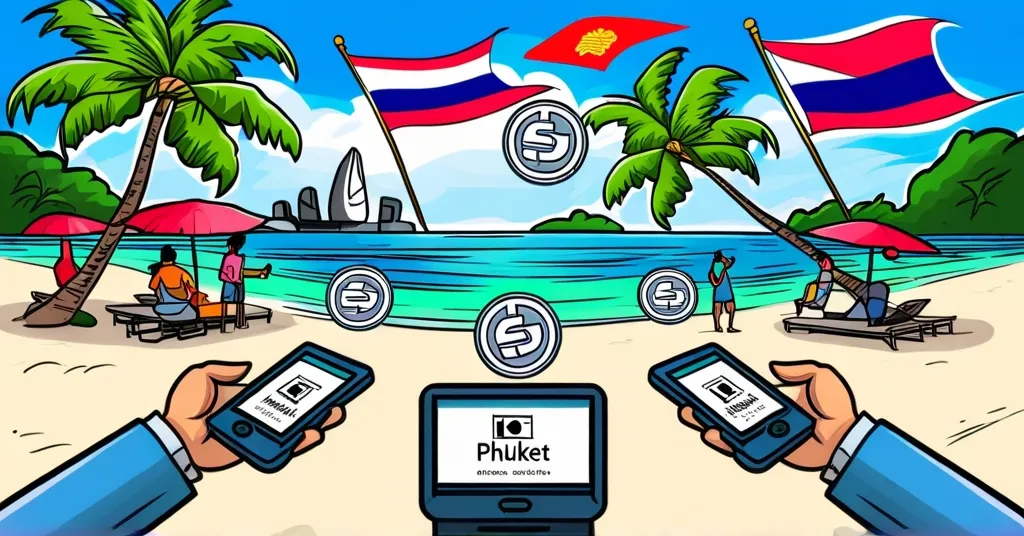Thailand Launches Phuket Crypto Sandbox by October: Boosting Economy with Stablecoins

Thailand’s Crypto Sandbox: A Bold Leap into Digital Finance
Thailand is set to launch a cryptocurrency sandbox in Phuket by October, led by former Prime Minister Thaksin Shinawatra, aiming to boost the country’s crypto sector, attract tech-savvy tourists, and stimulate economic growth.
- Thailand launches crypto sandbox in Phuket by October.
- Focus on stablecoins to enhance economic and tourist appeal.
- Part of ASEAN’s broader cryptocurrency dialogue.
Imagine sipping a cocktail on a Phuket beach, paying with a cryptocurrency as stable as the Thai baht. That’s the vision behind Thailand’s ambitious crypto sandbox initiative, spearheaded by former Prime Minister Thaksin Shinawatra. The sandbox, set to launch by October, is poised to be a game-changer for Thailand’s cryptocurrency landscape, aiming to attract tech-savvy tourists and breathe fresh air into the economy.
Thaksin Shinawatra sees this as a pivotal moment, emphasizing the need to leverage digital assets swiftly. “Cryptocurrencies should be leveraged quickly, as a delay might lead to the best minds moving to a better-suited environment like the United States,” he stated. This initiative isn’t just about keeping pace with global trends; it’s about sprinting toward the future and retaining top talent.
Phuket, a tourist hotspot, has been strategically chosen to encourage visitors with digital assets to spend locally, aligning with Thailand’s broader goal of economic revitalization through cryptocurrency adoption. The sandbox initiative is also part of ongoing discussions within the Association of Southeast Asian Nations (ASEAN), signaling a regional commitment to the growth of digital assets.
The sandbox will primarily focus on stablecoins, cryptocurrencies designed to minimize price volatility by being pegged to traditional currencies like the US dollar. Stablecoins come in several forms, including fiat-collateralized, crypto-collateralized, and algorithmic, each serving different purposes within the crypto ecosystem. By emphasizing stablecoins, Thailand aims to mitigate the risks associated with more volatile digital assets while fostering innovation. The initiative will also involve private sector participation, creating a controlled environment where regulators and businesses can experiment and innovate together.
Thailand’s journey with cryptocurrencies has been a rollercoaster. In 2022, the country initially banned crypto payments, only to later introduce more crypto-friendly regulations. The upcoming sandbox reflects an ongoing evolution in Thailand’s approach to digital assets, striving to balance innovation with regulatory oversight.
Nirun Fuwattananukul, CEO of Gulf Binance, expressed optimism about the project, noting, “The project will boost Thailand’s competitiveness and attractiveness to tech-savvy tourists and visitors.”
The project will boost Thailand’s competitiveness and attractiveness to tech-savvy tourists and visitors. – Nirun Fuwattananukul, CEO of Gulf Binance
However, the crypto sandbox isn’t without its challenges. The Thailand Securities and Exchange Commission (SEC) must navigate the complexities of regulating such a dynamic sector, possibly reconsidering the crypto payment ban under stricter guidelines. Robust regulatory measures, including compliance frameworks and penalties, will be essential to maintain the sandbox’s integrity and prevent misuse by bad actors. These measures could draw inspiration from similar frameworks implemented in other countries with crypto sandbox initiatives, like Singapore and the UK, each with their unique regulatory approaches.
From a global perspective, Thailand’s initiative aligns with the trend toward sandbox environments, allowing for experimentation under regulatory supervision. This approach could set a precedent for other nations grappling with digital asset integration. Yet, while the sandbox holds immense potential, it’s crucial to address potential risks such as cybersecurity threats and economic instability caused by volatile cryptocurrencies.
As Thailand embarks on this journey, the world watches with keen interest. Will the crypto sandbox in Phuket become a beacon for other nations, or will it face unforeseen hurdles? One thing is clear: Thailand is not just keeping pace with the digital age; it’s sprinting toward the future.
Key Takeaways and Questions
- What is the purpose of Thailand’s crypto sandbox?
The purpose is to foster growth in the crypto industry, attract tech-savvy tourists, and inject funds into the economy by providing a controlled environment for digital asset experimentation.
- Why was Phuket chosen as the location for the crypto sandbox?
Phuket was chosen to encourage tourists holding digital assets to spend them in Thailand, thereby boosting the local economy and attracting tech-savvy visitors.
- What role does the ASEAN play in Thailand’s crypto initiatives?
ASEAN countries have been holding talks with Thailand, indicating regional interest and potential collaboration in the crypto industry.
- What types of digital assets will the sandbox focus on?
The sandbox will primarily focus on stablecoins due to their lower risk profile compared to other digital assets. Stablecoins are cryptocurrencies designed to minimize price volatility by being pegged to traditional currencies like the US dollar.
- How has Thailand’s relationship with cryptocurrencies evolved in recent years?
Thailand’s relationship with cryptocurrencies has been mixed, with an initial ban on crypto payments in 2022 followed by the introduction of more crypto-friendly regulations later that year.
- What are the potential benefits of the crypto sandbox for Thailand’s economy?
The sandbox is expected to attract tech-savvy tourists, boost competitiveness, and provide a platform for economic growth through the adoption of digital assets. It could lead to increased tourism revenue and job creation in the tech sector.
- What regulatory measures might be implemented alongside the crypto sandbox?
The Thailand SEC might revisit the ban on crypto payments under stricter guidelines and could develop a regulatory framework to monitor compliance and enforce penalties for non-compliance. This could include frameworks similar to those used in other countries with crypto sandbox initiatives.
- What are the potential risks or challenges associated with the crypto sandbox?
Potential risks include cybersecurity threats, economic instability due to volatile cryptocurrencies, and regulatory challenges in maintaining the sandbox’s integrity. Addressing these will be crucial for the initiative’s success.



